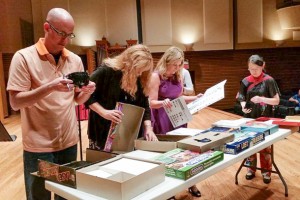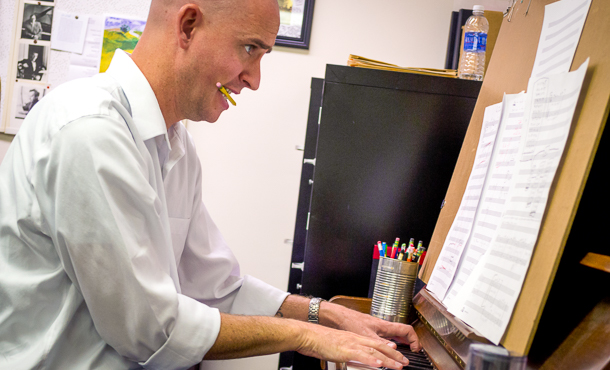Five hours, three instruments, unfamiliar musicians and a board game – these were the components of the 2015 Iron Composer competition in Berea, Ohio on Sept. 4. This year, Eastern Mennonite University assistant professor of music Ryan Keebaugh was one of five finalists selected from 3,000 global applicants. While he did not win, the competition stretched and challenged him as an artist (visit Keebaugh’s professional website).
The event is styled after the TV show “Iron Chef” – contestants must write a musical composition inspired by a “secret ingredient,” and score it for the ensemble at hand within a prescribed deadline. The pieces are performed that evening.
The contest has been staged since 2007 by the eclectic New York-based production company ANALOG Arts; the directors have local ties to the Ohio area.
Keebaugh responded to the call for submissions about a year ago with his choral composition “The Suffering Servant” (here performed by the University of South Florida Chamber Singers) and “Thy Light Which is Brighter than the Sun and Moon,” a choral and string composition commissioned by EMU music professor Ken J. Nafziger.
Keebaugh then forgot about the contest. At EMU, he has a busy schedule, teaching and instructing in the music program, as well as organizing leading the university’s elite vocal ensemble, Emulate.
When the invitation to compete came, though, he readily took up the challenge. At Baldwin Wallace University, Keebaugh met with fellow composers and competitors Kirsten Broberg of the University of North Texas, Dorothy Hindman of the University of Miami, Rica Narimoto of Japan, and eventual winner Tawnie Olson of the Hartt School of Music.

The five composers were provided antique board games as their “secret ingredient,” from which they could each choose one as their inspiration piece. Past years’ secret ingredients include musical motifs, a music box, an assortment of sticks and stones, eight seconds of silence, and audience participation. Contest organizers actively solicit new secret ingredients via their Facebook page. Keebaugh selected a 1980s game in which players build and navigate a Victorian mansion in search of hidden treasure.
“I’m a master of Mystery Mansion,” he joked. For the first 30 minutes of the five-hour composing session, he sat and played through the game by himself.
His composition, titled “Ardent Shimmer,” employs the sound icon to represent golden treasure. The sound icon, an instrument invented by Romanian-French composer Horațiu Rădulescu, is an open grand piano set on its side and played with a bow.
The other instruments of the predetermined ensemble were the celesta – a harmonium-like keyboard which controls hammers striking steel plates to play notes – and the recorder. Keebaugh used the celesta and recorder to represent opposing players racing through the mansion. After the writing session, each composer had a half-hour with the musicians to rehearse the composition before it was performed. A panel of judges selected the winner.
Olson, the winning composer, was awarded $500 in cash and a $500 commission for a new work.
The experience interested Keebaugh in composing for unfamiliar instruments, like the recorder, and showed him that he “can create something that’s artistic in five hours.”
The highlight of the “stressful, but fun” event was “meeting all these composers from all over the world, and seeing what they’re doing.” Keebaugh expressed affirmation for the four other composers – in the male-dominated field, a contest of 80% female competitors is unusual.
“It’s about time, because they’re all so talented,” he said.
Keebaugh brings back to his personal work the confidence that, to compose well, “just follow your instinct, and your own voice,” rather than try to imitate others’ styles.
To listen to the music of Iron Composer finalists, click here.
